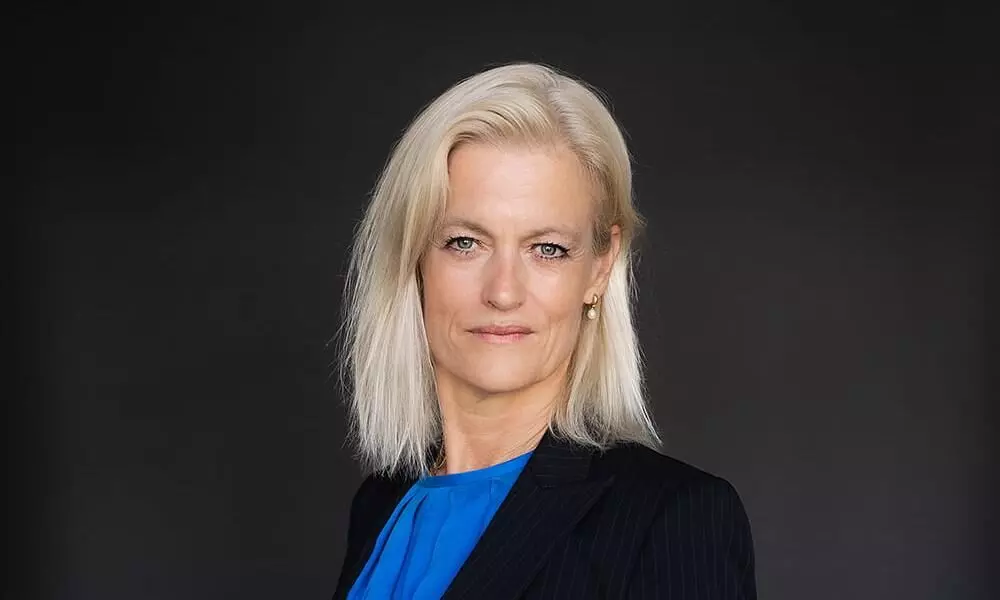
“Be creative with the capacity,” says Elisabeth Oudkerk
Qatar Airways Cargo is working hard to perform better than the market with the enormous network it has and being as creative as possible with its capacity

Elisabeth Oudkerk, SVP, Cargo Sales and Network Planning, Qatar Airways
Qatar Airways Cargo completes 20 years of freighter operations in 2023. Years before the launch of its freighter operations, Qatar Airways launched its cargo division as part of the company revamp in 1997 with a team of five cargo staff. They sold cargo space on leased passenger planes. From one Airbus A300-600 converted freighter in 2003 to a fleet of 31 freighters in 2023, the Doha-headquartered carrier continues to be the world’s largest cargo carrier since 2019. Qatar Airways began regular operations to Amsterdam and Chennai, and shortly thereafter to New Delhi.
Today, the cargo airline operates more than 160 belly-hold and over 70 freighter destinations. The airline’s freighter fleet includes two Boeing 747-8 freighters, two Boeing 747-400 freighters, 26 Boeing 777 freighters and one Airbus A310 freighter. It also has an extensive road feeder service (RFS) network. With considerable investments in its products, services, quality handling, infrastructure, facilities, people and procedures at each of its destinations, the cargo carrier provides high operating standards for the transportation of cargo.
As per the latest available world air transport statistics data from International Air Transport Association (IATA), in 2022 Qatar Airways recorded 15,889 million cargo tonne kilometers (CTK) making it the largest cargo carrier in the world among combinations carriers. However, in 2022 it ranked third behind Federal Express (FedEx) and United Parcel Service (UPS). But in 2021, there was only FedEx ahead of Qatar Airways. In the combination carrier ranking, its closest rivals include Emirates and Korean Air.
“We take immense pride in our history and anticipate contributing to the promising future of air freight,” said Elisabeth Oudkerk, Senior Vice-President, Cargo Sales and Network Planning at Qatar Airways. Oudkerk, who completes a year in Qatar Airways in September 2023, is thrilled to be part of the historical moment despite the headwinds in the global air cargo market.
“Global air cargo market conditions are very challenging at the moment and there is nothing that you can do to change them. But with the enormous network that we have, we are being very creative with the capacity and working hard to perform better than the market.” |
“Market conditions are what they are and everyone can see that. We are here for the long term. Global air cargo market conditions are very challenging at the moment and there is nothing that you can do to change them. But with the enormous network that we have, we are being very creative with the capacity and working hard to perform better than the market,” said Oudkerk who has been holding the fort at Qatar Airways Cargo since the departure of Guillaume Halleux, chief officer cargo, in mid-August this year.
With the launch of its Next Generation strategy, Qatar Airways Cargo has defined its role in the air cargo industry by bringing a fresh and innovative approach to business across its network and operations through enhanced products and services, cutting-edge technology, a commitment to sustainability and diversity. With the Next Generation strategy, Qatar Airways Cargo has managed to achieve a few milestones that include the first airline globally to complete the suite of IATA CEIV certifications, the launch of the Kigali Africa hub in partnership with RwandAir, and the introduction of innovative products like Pharma, Fresh, Courier, SecureLift and the re-launch of its Mail product with key enhancements.
In the recent past, Qatar Airways announced a number of important long term strategic partnerships with shippers and forwarders to lock in long term capacity arrangements.
Qatar Airways Cargo has a fleet of 31 freighters that include B747-8s, B747-400s, B777Fs and A310F
The one with global freight forwarder DSV creates direct scheduled service between Huntsville in the US and Doha offering 200 tonnes of capacity per week. The new air charter route, named Gateway Star, departs from Mexico City to Doha via the strategic hubs of Huntsville and Luxembourg. This route also has the potential to extend beyond Doha by seamlessly integrating with Qatar Airways Cargo's global feeder network and becoming a pathway to other destinations. This collaboration introduces bi-weekly flights with direct cargo loading and management handled by DSV, and full commitment and lift by Qatar Airways Cargo. “With the addition of Huntsville, Qatar Airways Cargo’s network in the Americas now increases to 22 destinations,” said Oudkerk.
Responding to a question of the current challenge of striking long-term partnership for controlled capacity with forwarders Oudkerk said that the pressure is on both sides. “So it is about finding the balance in such a partnership that is of value to both partners. We look for a long term partnership. But we know that no one can read the market and find what is going on. Sometimes we do find that there is still some demand for long-term commitments.”
Some of the other important announcements include the launch of a weekly freighter service to Warsaw in Poland. This is in addition to the belly cargo capacity available in 10 weekly services the carrier already operates. With the addition of a weekly freighter,the cargo capacity increases to more than 200 tonnes from Warsaw.
Qatar Airways Cargo resumed freighter services to Bahrain in September launching three weekly freighter operations. This is in addition to the 21 weekly narrow-body passenger flights to Bahrain. With this there is more than 200 tonnes of weekly cargo capacity to/from Bahrain. The imports into Bahrain consist of general cargo and perishables like fruits, vegetables and meat while exports from Bahrain include general cargo and dangerous goods.
China has always been a key market for Qatar Airways both for its bellies and for the freighters. The recent partnership with Xiamen Airlines opens direct non-stop flights and Xiamen Airlines becomes the first Chinese airline to operate passenger non-stop flights from Mainland China to Qatar. Under the agreement, the Chinese carrier will launch daily flights between Beijing’s Daxing International Airport and Doha’s Hamad International Airport. In addition to the flights from Beijing, the carrier will also launch two weekly flights from Xiamen, the special economic zone of Fujian Sheng province, to Doha. It has already commenced belly hold flights to Chengdu and Chongqing in September serving three times a week by Airbus A330-300 aircraft. According to Oudkerk, with the Xiamen partnership Qatar Airways Cargo will serve nine destinations in mainland China, offering over 2,800 tonnes of weekly cargo capacity.
“We started the whole digital journey to be where our customers are. Make multiple channels available to them to do bookings and make that process easy with their own choices. We are steadily increasing things that they can do on our digital platform.” |
For Qatar Airways Cargo and for Oudkerk, there is both challenge and opportunity in the current market. “What we are trying to achieve is a balance taking advantage of the geographical position where we are located. Trying to decide how many flights we can operate to the West and to the East. Some countries are still struggling in terms of air cargo demand, therefore we look for other markets,” she said. “So we are working very closely with pricing, revenue management and network planning teams to find opportunities and improve everything,” she added.
Digitalisation has been a critical area of investment and growth for Qatar Airways Cargo. Besides making its capacity available across all digital marketplaces for forwarders to buy cargo capacity on Qatar Airways Cargo network, the carrier has been working with PROS (Profit and Revenue Optimization Software) to offer real-time, reliable, and personalised pricing with each shipment requested via its Digital Lounge.
The latest update is powered by PROS Smart Price Optimization and Management which is now live on all online booking channels across its network. The real-time pricing engine provides Qatar Cargo customers an enhanced digital buying experience that allows immediate online booking confirmation with accurate, personalised pricing.
Part of The Next Generation initiative, Qatar’s Digital Lounge places an emphasis on user experience and ease of use, allowing customers to price and book cargo shipments without the need to call or email the sales team directly. With PROS Smart Price Optimization and Management solutions, Qatar Airways Cargo powers its online channels with real-time personalised dynamic pricing, accessing live capacity to offer accurate and bookable rates. The AI-powered optimisation solution models improve win rates by personalising the price offering and maximising sales.
With large volumes of complex pricing requests, PROS Air Cargo Orchestration Services enables Qatar Airways Cargo to provide real-time, optimised prices to third-party digital marketplaces such as WebCargo, CargoAI and Cargo.one. Being able to respond to these requests with profitable, accurate pricing in a way that is reliable, performant and scalable provides customers with a premium experience that Qatar Airways Cargo claim “only a few can offer”.
Oudkerk said that she is happy with the pace of digitalization drive in Qatar Airways Cargo and promises that investments will continue to make the digital transformation all pervasive and across its network and geographies.
“We started the whole digital journey to be where our customers are. Make multiple channels available to them to do bookings and make that process easy with their own choices. We are steadily increasing things that they can do on our digital platform,” said Oudkerk.
According to Oudkerk, the outcome of the digitalisation initiatives has gone beyond what we initially expected. “We see that we have exceeded the target that we have set for this year. It’s a nice moment in time to see the growth of digitalization and its adoption in our Digital Lounge,” said Oudkerk.

